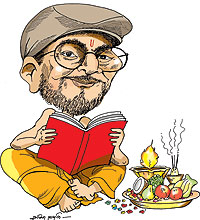 Secularism is one of the 18 forward-looking agendas collectively adopted by the five party coalition campaigning against 'regression'. Details haven't been clearly spelled out, but presumably genuine religious freedom is all that the mainstreamers are aiming for.
Secularism is one of the 18 forward-looking agendas collectively adopted by the five party coalition campaigning against 'regression'. Details haven't been clearly spelled out, but presumably genuine religious freedom is all that the mainstreamers are aiming for. The secularism of the Nepali Congress and UML is sure to be much less unsettling than the idol-smashing, cow-butchering, temple-desecrating, and Sanskrit-censuring atheistic politics of the Maoists.
Yet, this harmless agenda of parliamentary parties has ignited vociferous protests. All kinds of Hindu outfits that mutely watched Maoists' excesses for eight years are suddenly up in arms against the very idea of secularism. The 'World Brahmin Conference' may herald a Hindu backlash against modernist parties conducting relay hunger strikes in urban areas.
Hindu militancy is largely an urban phenomenon even in neighbouring India. The Brahmin warriors of Banaras and Vadodara, pretending to be modern avatars of mythological Parsuram (the Hindu sage who attained Brahmin status on the strength of his penance, and then went on to eliminate sinning Kshatriyas) seldom venture out to places like Kashmir and Nagaland where Hinduism is on the verge of extinction.
It's not surprising that the faculty of the Mahendra Sanskrit University of Dang spend most of their time in Kathmandu. Brahmins consider themselves to be heaven-born entitled by birth to all the privileges available in this world. As ordained by Hindu scriptures, "The Universe is under the power of the gods. The gods are under the power of the mantras. The mantras are under the power of the Brahmins. Therefore the Brahmins are our gods." And how!
Nepal is still a Hindu Kingdom, and in the Hindu scheme of things, Chhetris may rule but there are always powerful Bahuns off-stage. Surya Bahadur Thapa owes his premiership to the grace of King Gyanendra, in addition to the rumoured backing of 'foreign forces'. But his cabinet secretary, Bimal Koirala, has risen from the ranks and is not beholden to anyone save the rules of civil service and his own conscience. It will not be surprising if the bureaucracy paid more attention to Bimal Koirala's instructions than to the commands of a stopgap prime minister.
Kathmandu is currently hosting the foreign secretaries' meet of SAARC, and Madhu Raman Acharya, is leading the Nepali delegation. Yet another Bahun, Madan Bhattarai is the articulate spokesperson of foreign ministry. The traditional dominance of Bahuns over foreign relations in the Shah court has been so complete that the external affairs department during the Rana regime was known merely as the Jainshi Kotha. General Pyarjung Thapa may be at the helm of the Royal Nepali Army, but its psy-war expert is none other than Biye Kumar Sharma.
Maoist ideologue Baburam Bhattarai was recently spotted circumambulating the temple of Manakamana with his elderly parents, journalists dutifully in tow. Even years of ruthless war doesn't seem to erase the caste legacy of 6,000 years. The janjati, dalit, and women base of Maoists notwithstanding, its leadership too is firmly in the hands of Comrades Dahal and Bhattarai.
The legislative arm of government, when it is functional, is also Bahun dominated, with the leaders Messrs Koirala, Nepal and Pokhrel all caste-mates. Graftbuster Surya Nath Upadhayay and most of his colleagues in the CIAA are Bahuns. Chief Justice Kedar Nath Upadhayay, the entire judiciary, including most Bars, are Bahun-dominated.
The Fourth Estate is also a near-Bahun preserve. Name any prominent journalist in Nepal, and you can almost be sure he (media continues to be a male preserve) is likely to be a Ghimire, Koirala, Dahal, Upadhyay or, as with this paper, a Dixit. Bahuns were, and still are, scribes.
This is why the World Brahmin Conference couldn't have chosen a better venue than Kathmandu. It's convener restaurateur B L Sharma may or may not have his own political agenda, but it wouldn't be surprising at all if the meet comes up with a decision to uphold the primacy of monarchy in the only Hindu Kingdom of the world.
Noted Indian constitutionalist B R Ambedkar once observed that graded inequality and supremacy of the heaven-born was an inalienable part of Hinduism. In disgust, he later embraced Buddhism. If Brahmins don't reform Hinduism, they will be the only caste left with such an archaic faith. The reform must begin by accepting that secularism in the affairs of the state is an inevitable and indispensable part of democratic polity. No other form of statecraft can meet the challenges of governing a multi-ethnic nation state.



